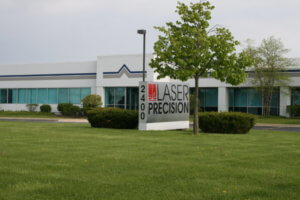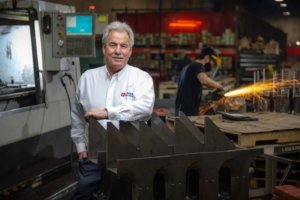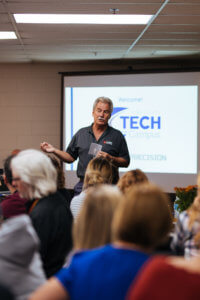How Laser Precision Became an Industry Leader: Vision, Hard Work and Planning
August 29, 2022
How Laser Precision Became an Industry Leader: Vision, Hard Work and Planning

Laser Precision, located in Libertyville, Illinois, is one of the leading fabrication shops in the nation. Its customer base includes prominent names in industries such as agriculture, heavy equipment and defense, among others.
Like all manufacturing firms today, Laser Precision functions in a difficult environment due to the pandemic, supply chain issues, soaring raw materials prices and skilled labor shortages. What makes this organization stand out from the competition and thrive in the face of these challenges?
We sat down with Jeff Adams, President and Founder of Laser Precision, to gain some insights on how the operation evolved from a one-machine startup to the powerhouse that it is today.
Embracing Laser Technology—and Fatherhood
In the early 1980s, Jeff was working in technical sales for a package engineering company. He remembers visiting a grungy tool and die shop with a co-worker. “Take a look around,” his colleague said. “Someday soon, all of this is going to be done with lasers.” Since Jeff considered this person to be a mentor and visionary, he took the comment to heart. “It prompted me to start reading about lasers and physics,” he said. “I made countless trips to bookstores and the library, building an understanding of laser technology, and CNC and motion systems as well.”
Jeff’s studies paid off. He soon went to work for the West German Laser Company, which made wood cutting laser machines. It wasn’t long before he became the Sales Manager for Mitsubishi Laser Systems. He was their first U.S. employee. Jeff spent eight and a half years with Mitsubishi, eventually selling 100 to 120 laser machines a year. But his success had a price. “I was traveling 200,000 miles a year,” he said. “It got to be too much with three small kids. I wanted to watch them grow up.”
Entrepreneurship

Photo by JOHN R. BOEHM
Mitsubishi had asked Jeff to help design a flying optics machine, a laser system where the remains stationary and the mirrors move in both the X and Y axes. Once the project was complete, Jeff made a deal. “I told them I wanted to buy the new machine and start my own business,” he said. “They wanted me to stay, but I was ready to move on.”
Mitsubishi gave him a favorable financing program, and in 1994, Jeff started his own company in a 1,000 square foot space with that first laser machine. He named it Laser Precision because, put simply, “Lasers are precise, and we make precise parts.” His first employee was Victor Martinez, who is still a Vice President at the company.
“I knew by having my own business, I was signing up for additional work,” he said. “But it would allow me accomplish my personal goals and still be with my kids.”
Jeff determined the best way to create a business niche was to provide laser cutting as a service to other fabrication companies. “This was a good move at the time because there were fewer shops that had lasers,” he said. His strategy paid off and the company turned a profit within the first two months, followed by slow but steady growth. It was a promising start, but Jeff had more new ideas in mind for the business.
A New Business Paradigm
While designing the flying optics machine for Mitsubishi, Jeff had written a white paper which included a section on what the industry was going to look like in 20 years. “It was what I felt the future held for technology,” he said. “Through a stroke of luck, it ended up being pretty close!” Jeff felt that a key takeaway from the piece was the importance of information as it relates to manufacturing. Specifically, utilizing data far more effectively to drive the manufacturing process. “Too often, I saw people running around with notepads and post-it notes, trying to get information from somewhere in the shop,” he said. “By 2004, we recognized that unless we embraced effective data usage, we would not be able to grow the operation.” Laser Precision thus began a pivot toward becoming an information processing company.
A Competitive Advantage
Successful interpretation and deployment of customer information has become a differentiator, separating Laser Precision from other fabricators. “It may seem like a simple thing,” Jeff said. “But miscommunication due to a garbled message or fat-fingered data entry usually results in the wrong product being made. The customer wanted a horse and gets a camel.”
Laser Precision has developed an intelligent system that enables the team to accept, interpret, decipher and deploy information far more effectively. “The agility in the system eliminates the need to expedite orders,” Jeff said. “Customers just send the electronic signal that is the change demand, and the system adjusts.”
He gave an example. “We make 13,000 part numbers for a major heavy equipment manufacturer and get about 2,000 order changes from them each day,” he said. “Our systems take this volatile order stream and turn it into conformance, allowing us to maintain our 99.92% on-time delivery rate.”
The system is in a constant state of refinement. “Historic data provides a path to excellence,” Jeff said. “Decipher the data, refine the rules, refine the technology.”
The People Side

State-of-the-art software won’t help a business much if it doesn’t have a quality workforce. Programs such as personal finance training, equipment machine cross-training and tuition assistance enhance worker satisfaction and attract potential employees. Jeff maintains a hands-off management style. “My choice has always been to provide direction on the outcome, offer some ideas and allow people to work things out themselves,” he said. “I’ll get involved if it becomes apparent there’s a problem, but that seldom happens because we have such effective personnel.”
Jeff’s solid grounding in laser technology, combined with a talent for predicting future trends and the creation of a nurturing workspace, give Laser Precision the agility to tackle today’s business challenges that the competition just can’t match.
If you have a fabrication project or are thinking about a career in manufacturing, please contact us. We’d love to talk with you.

